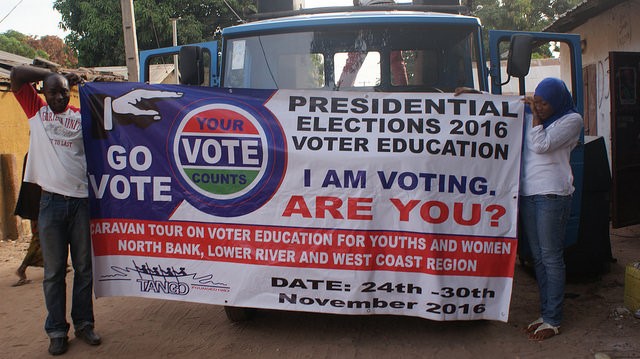The Next Steps After a Great Jump: Sustaining Democratic Gains in The Gambia

The Gambia had the greatest annual increase in freedom, according to Freedom House’s 2018 Freedom in the World report.
On a scale of 0 to 100, Gambia’s score rose 21 points due to drastic improvements to the freedoms of expression, assembly, and association. As The Gambia embarks on consolidating its democratic gains, the prospect of living in a free society following 22 years of a brutal dictatorship has many Gambians eager to see progress as a result of the recent transition.
President Yahya Jammeh’s fall from power surprised many Gambian and African politics watchers. A despotic leader, Jammeh had demonstrated no willingness to step down and used a series of repressive tactics throughout his regime to spread fear and eliminate challenges to his authority. His actions backfired in the lead up to the December 2016 election as they helped to catalyze the formation of a unified opposition coalition and drove youth groups’ commitment to seeing change. To support the increasing momentum at the time, the International Republican Institute (IRI) assisted Gambian civil society organizations to mobilize citizens and conduct voter education campaigns throughout The Gambia, which contributed to defeating a longtime dictator in an election.
Following a tenuous period when Jammeh temporarily refused to step down and regional troops intervened, Adama Barrow, the opposition coalition’s candidate, was sworn in as Gambia’s new president on January 19, 2017, paving the way for legislative elections that took place on April 6, 2017. Political parties that formed a coalition to oppose Jammeh during the presidential election won the majority of the 53 elected seats available in the National Assembly. Most of the victorious candidates, while very committed to a “new” democratic Gambia, had little experience in governing or policy-making.
In 2017, the National Assembly worked quickly and passed several laws that set the groundwork for urgent reforms such as setting up transitional justice mechanisms for crimes committed under Jammeh and amending the Constitution. To strengthen the legislative branch, IRI is supporting members of the National Assembly as they amend undemocratic laws enacted under the previous regime and exercise oversight over the executive branch. In addition, IRI is working with members as they craft responsive policies, conduct constituency visits, and review national budgets and development plans. IRI’s backing is important as the National Assembly works to establish itself as one of the three co-equal branches of government.
Continued assistance to The Gambia’s fledgling democratic institutions is critical. This became clear when Dr. Ismaila Ceesay, a Gambian professor and political analyst, was detained on January 31, 2018, for criticizing President Barrow’s relationship with the military. While local civil society was quick to organize protests and Ceesay was released after one night in detention, the episode was a reminder of a need for sustained efforts to undo a repressive political culture propagated under Jammeh’s absolute rule. The National Assembly has an important role to play as a check to the executive branch, especially when the latter’s actions threaten to reverse democratic gains.
In December 2016, Gambians saw an opportunity to choose freedom and seized it. As activists proclaimed during the transition: “Gambia has decided!” Beyond electing a new president, the Gambian people put their lives on the line to usher in a new area of freedom and democracy. To honor the hard-fought efforts of Gambians, elected officials will need to continue fostering a transparent and accountable government that serves the people and secures the gains made thus far. IRI will be there to support their efforts along the way.
To learn more about IRI’s work in the Gambia, download the February 2018 edition of the Institute’s Global podcast. This episode features experts who explained how the Gambian people took the first steps toward a free society.
Top